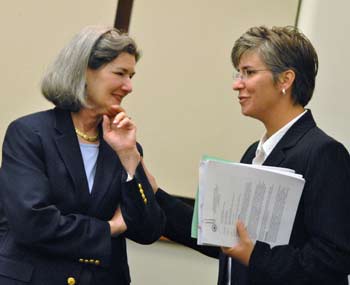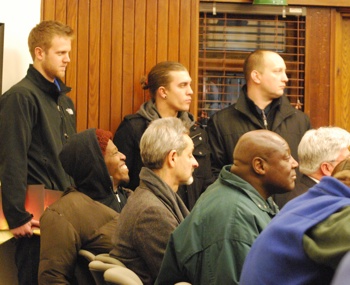Washtenaw County board of commissioners meeting (Oct. 17, 2012): With only two more meetings remaining in 2012 – both falling after the Nov. 6 election – county commissioners dispatched a range of agenda items on Oct. 17, including ordinance changes and budget-related action.

From left: Washtenaw County treasurer Catherine McClary and Mary Jo Callan, director of the county/city of Ann Arbor office of community & economic development. Both women attended the Oct. 17 meeting of the county board of commissioners to address agenda items. (Photos by the writer.)
But they spent much of their discussion on a topic not on the agenda and not requiring a vote: public transit. It emerged that the county administrator now will be sending out additional notification letters to local jurisdictions about a new transit authority, called The Washtenaw Ride. The AATA had initially sent letters notifying jurisdictions of a 30-day window ending Nov. 2.
The new letters, which will likely be sent in early November and alert municipalities to a second 30-day window for opting out of the new authority, were originally expected to be sent by The Washtenaw Ride. But there’s been a delay in forming the new board, so the Ann Arbor Transportation Authority has asked that the county handle the notification process. The county had filed the articles of incorporation for the new entity in early October, at the AATA’s request.
Some commissioners were concerned about the cost – because the agreement that lays out the process for forming the Washtenaw Ride indicated the county would not be financially responsible for any expenses. The following day, AATA CEO Michael Ford stated at the AATA board meeting that the county would be reimbursed for its expenses.
Part of the county board’s discussion on public transit also centered on proposed state legislation to set up a regional transit authority (RTA) for Detroit and the counties of Washtenaw, Wayne, Oakland and Macomb. Some commissioners wanted more information about Washtenaw County’s involvement, and asked for a working session on the topic.
Added to the agenda during the Oct. 17 meeting was a countywide civil infractions ordinance. It was given initial approval by commissioners – with a final vote and public hearing scheduled for their Nov. 7 meeting. Currently, criminal misdemeanors are the only penalty that the county can apply for an ordinance violation – for infractions like not having a dog license. The intent of the proposed ordinance is to give the county more flexibility to designate violations of other county ordinances as a civil infraction, rather than a criminal misdemeanor. The proposed fines would be $50 for a first offense, $100 for a second offense, and $500 for a third or any subsequent offense.
The board also passed a policy to reduce barriers to breastfeeding in Washtenaw County facilities, and gave final approval to an ordinance change that shifts responsibility for the county’s accommodation tax from the county treasurer to the county finance director. The accommodation tax is collected from hotels and motels.
Also approved was a one-year extension for the coordinated funding model that’s been piloted for two years as a way to more effectively fund local human services nonprofits. An evaluation of the program – a partnership between the county, city of Ann Arbor, United Way of Washtenaw County, Washtenaw Urban County, and the Ann Arbor Area Community Foundation – is expected early next year.
The board received a preliminary apportionment report for Washtenaw County, giving details of the 2012 taxable valuations for property in the county, by municipality. And commissioner Rob Turner reported that a new actuary has been selected to conduct reports on the status of the county’s employee pension and retirement health care funds. Turner is concerned that the fund balances are too low, leaving the county with unfunded liabilities that need to be addressed.
Speaking during public commentary, John Wagner – a volunteer for Camp Take Notice – urged commissioners to consider providing a county facility for the homeless, as winter approaches. The meeting also included recognitions of work done by SafeHouse Center, a domestic violence shelter, and local cooperatives like the Inter-Cooperative Council (ICC) of the University of Michigan. Gaia Kile, vice president of the board for the People’s Food Co-op, told commissioners that the hope is to turn these types of “highly democratic economic institutions” into the fastest-growing segment of the economy. [Full Story]






